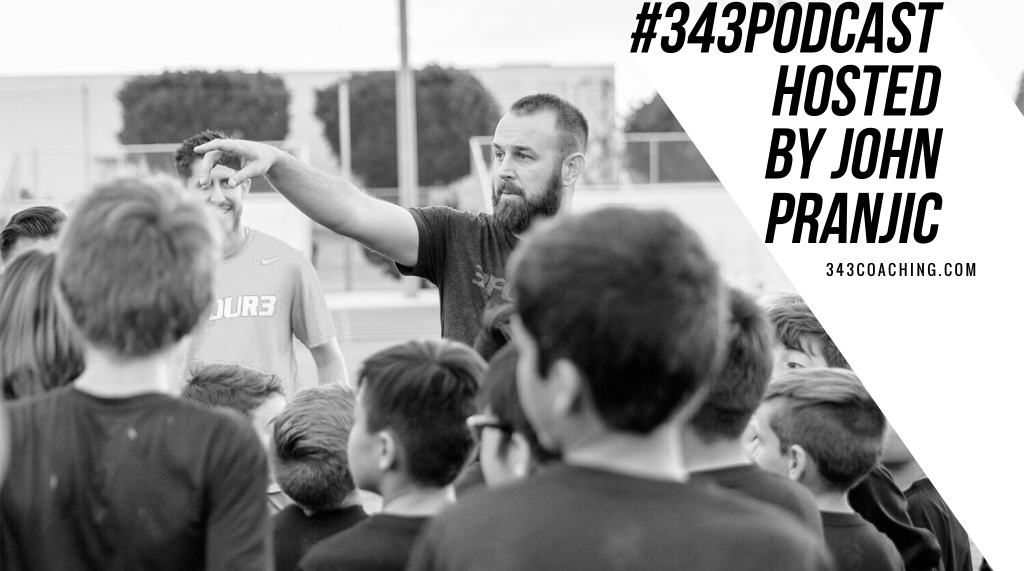

This episode is a hybrid of two important articles that played a major role in shifting my mindset as a coach.
And that’s exactly what I needed during that time of my coaching career.
First, a personal story before getting to the articles.
Last night, I wrote what is best described as a reflection piece. It was part of my USSF C Course. The topic was setting goals and identifying some specific things that will help me achieve those goals in the future.
As I sat in my room, computer on my lap, I started thinking about the biggest influences and most derailing moments of my coaching career.
Three failed attempts over the course of several years before actually getting into the C course absolutely devastated me. That stupid piece of paper became a barrier to entry that I couldn’t break down and was a major set back.
But not being able to get into that course also led to me to new educational experiences, opportunities, and relationships that I may not have been exposed to had I been granted access to the traditional soccer coaching education route in my early twenties.
I was forced to break away from the pack and find my own ways to teach myself about the game. And honestly, it made me a far better coach and gave me a far better understanding of the sport.
I found a few mentors that were trailblazing their way through American soccer in a way that was literally capturing attention and headlines from around the world. I decided to look deeper and deeper into what they were doing.
After years and years of studying their material, driving hours and hours to sit in empty stadiums to watch “little kids” play, and eventually getting the opportunity to create and share educational opportunities for others alongside my mentors, I realized that maybe this unconventional path wasn’t so bad after all.
So, as I sat in my room last night, computer on my lap, thinking about my biggest influences and most derailing moments of my coaching career, I remembered exactly how important 3four3 has been in regards to opening my mind and seeing American soccer from a different angle.
Part of the reason why I started this podcast before it was the #343podcast, was to find and share information with other coaches. I knew there were other coaches out there like me that were trying to build their own soccer education. That’s what I’m still doing and I know there are others doing the same.
Where am I going with all of this?
Well, this is where I somewhat awkwardly transition into the topics for this episode.
Topics that, in some circles, are taboo. Topics that, in some circles, are misrepresented. Topics that, in some circles, are ignored.
To tie it together, I guess you could say that 3four3 is the place I learned how to think outside of the U.S.S.F. box.
And these two short, but potent articles I’m about to share are clear examples of what coaches need to hear, need to think about, need to discuss, but don’t.
It was articles like these that really helped me develop into a better coach and become a better leader. It was articles like these that provided new ideas that sparked the real team, player, and coach development.
So, what follows are two articles written by Gary Kleiban and published by 3four3 separated by a quick transition of my own thoughts.
Here we go!
The 50/50 Rule of Coaching: Looking Beyond the Win/Loss Columns
First 50
The right activities and the efficiency of your training sessions only get you to 50%.
By the “right activities/exercises” I mean right with respect to your philosophy of course.
For instance, what’s the point of doing activities that work possession out of the back, if all you do in games is allow your back line to be playmakers? If your back line is going to be bypassing the midfield or trying to filter balls and thread the needle, why work possession?
Now, presuming the exercises you run in your sessions are perfectly architected to support your vision, you’re still only at 50%.
And that’s an F!
Second 50
The remaining 50% is in the delivery. Meaning, more than laying out the cones and having players go through the exercises in a mindless fashion. This 50% is the hard part! This is the art of coaching!
It involves not only understanding all the nuances involved with the exercises and the context in which they fit, but also the communication, charisma, and leadership to make it all come together.
In other words, how close does one come to squeezing out the best in every player in the appropriate context?
I wonder where you think coaches are operating at …
What do you think they score in each?
My hope is this gives you an alternative form of guidance from the Win/Loss columns.
Okay, now the transition into the second article.
Before getting any further, I think it’s important to highlight that winning and development are often separated when they shouldn’t be. If real development is happening, results should follow.
So, if you have selected the right set of core activities that are in line with your philosophy and your delivery is on-point… well… to be blunt… you should not be losing.
Which leads us to the second article.
Who Else Wants to Win?
Winning fucking matters!
And don’t you ever forget it.
The only question (AND IT’S A CRITICAL ONE) really revolves around context. Under what circumstances has winning occurred? What were the pros/cons considering short, medium, and long-term objectives?
But, whatever your answers … on the whole, winning matters.
Chronic losers have conveniently taken a great thing and turned it into the ultimate excuse.
They’ve taken the meme “winning at all cost” to vilify winners and shelter themselves.
So again:
Winning Matters
Winning Matters
Winning Matters
Don’t be a lemming. Don’t follow the losers off a cliff.
Whatever your short, medium, and long-term objectives …
Winning is the currency that enables you to continue your process.
Let’s wrap this up.
The last line in that short article is so fucking powerful.
I’m going to write it again.
I love it.
Like Gary wrote, winning has been vilified in American youth soccer.
In fact, it’s become a word that is almost off-limits when it comes to traditional coaching education.
You don’t hear anyone talking about winning anymore. Instead, you hear the word “development” in its place.
Winning matters.
To wrap all of this up, I’m pumped that I chose to learn from proven winners. Guys that lifted the curtain and showed what actually happens when real development takes place. This has never been the educational route I expected to take at the beginning of my coaching career. But I believe it’s been the right one.

Be sure to check out the benefits of joining a program that helps coaches develop winners and isn’t ashamed of it.
Coaching Education Program
This is brought to you by the 3four3 coaching education program.
Learn more and join over 400 coaches using our proven possession-based methodology.
Leave a Reply